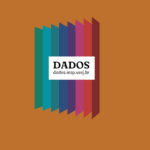Marcia Gobbi, Professor at the Education School at Universidade de São Paulo – FE-USP, Teaching Methodology and Compared Education Department, EDM, São Paulo, SP, Brazil.
 The paper “Nóis” é ponte e atravessa qualquer rio*: notas sobre mulheres, crianças, coletivos periféricos e o comum (or, “Quando a pandemia é apenas mais um elemento”), published in the Cadernos Cedes journal (vol. 42, no. 118), had the objective of identifying the social practices associated with caring and education between peripheric women and children considering the existence of what has been called ‘a pedagogy of urban struggle for housing and its approach to the common’.
The paper “Nóis” é ponte e atravessa qualquer rio*: notas sobre mulheres, crianças, coletivos periféricos e o comum (or, “Quando a pandemia é apenas mais um elemento”), published in the Cadernos Cedes journal (vol. 42, no. 118), had the objective of identifying the social practices associated with caring and education between peripheric women and children considering the existence of what has been called ‘a pedagogy of urban struggle for housing and its approach to the common’.
Based on the definitions brought by Pierre Dardot and Christian Laval (2015), I understand that the “Common” is a political and philosophical principle grounded on the collaboration and self-management of the “Commons”. In the words of these authors, it is not about common goods, as private property, but principles from which the Common is constructed, which belongs to everyone, without privatist conceptions. The Actives of the practices of the Common are those who produce it, in this case, especially women and children.
In addition to that, many relationships are established, including entrepreneurism practices, solidary economy and collectivity, bringing reflections about important political principles of education, spatial production and other social practices, above all, enticed by women in relationship with the children, tensioning the bourgeoisie family model, the patriarchalism, the relationships between social classes, and those already known relationships between adult women and children.
The elaboration of the paper derivates from the bibliographical research about urban collectives, from listening to the people inhabiting the regions studied and the record in the format of podcasts produced by, and about those collectives containing many interviews with these individuals. The study was conducted for the most part in two peripheral regions in São Paulo city, namely, West and South zones, at the Juntas na Luta and UniGraja collectives respectively, during the second half of the year of 2020 and the first semester of 2021.
The poem “Nóis é”, from the poet Marco Pezão, deceased, who lived at the outskirts of the South Zone of São Paulo, borrowed as the title of the paper, added to the important theoretical productions situated in the urban sociology, anthropology and education, and served as a starting point for reflection.
Figure 1. Drawing by Ana Vitória, from the Prestes Maia occupation.
Marco Pezão metaphorically defines the peripherals and its solidary practices as bridges that cross any river, in reference to the countless ways of segregation that exist in the city, which being on one or the other side of the bridge defines practices, social classes and ways of organizing the daily fights. These fights merge the urgent necessity of survival in front of the struggles imposed by excludent government plans and, at the same time, point to the apparent impossibility generated by different social and economical inequalities.
The research was conducted in times that denote the crises in the contemporary capitalism in which we feel – some much more than others – the harsh measures taken for its permanence in its increasingly fierce and opulent ways of exploitation, in which “the cattle has passed many gates”, taking advantage, cynically and perversely, of the purposely bad administration of the pandemic. Miseries surface in front of our eyes. During the covid-19 pandemic the construction and deepening of the already present, and yet unknown, solidary relationships, mainly led by women, was observed.
The effort undertaken in this research resides in presenting notes for reflection about collectives, commons, and covid-19 from some of their practices in the urban outskirts of São Paulo city and aim to contribute to the studies of education, in order to comprehend other pedagogies that exist outside the school, mainly in the social movements and collectives.
There must be courage to look to the post-pandemic future considering it together with the past and what has been produced in it. There must return to the hands – grasp by the fingernails – the urgency of structural changes in Brazilian society. We already know what has been done to the world and the result of those actions. We cannot repeat them. This is our intended contribution to provoke reflections and add with them in the way for urgent changes.
Below, listen to Marcia Gobbi’s podcast (in portuguese) about the role of collectives in pandemic times.
*The term “Nóis é” refers to the meaning of “We are” in an informal manner and is the title of a homonymous poem cited in the paper.
Reference
GOBBI, M. Desenhar e ocupar: crianças na Mauá, Ipiranga e Prestes Maia. São Paulo: Instituto de Estudos Avançados da Universidade de São Paulo, IEA-USP, 2022.
To read the paper, access
GOBBI, M. “Nóis” é ponte e atravessa qualquer rio*: notas sobre mulheres, crianças, coletivos periféricos e o comum. Cad. CEDES [online]. 2022, vol. 42, no. 118, pp. 359-372 [viewed 6 December 2022]. https://doi.org/10.1590/CC253004. Available from: https://www.scielo.br/j/ccedes/a/czDzHhHsDHQBjT77ML84PXD/abstract/?lang=en
External links
Cadernos CEDES – CCEDES: http://www.scielo.br/ccedes/
Cadernos CEDES, Volume: 42, Número: 118: https://www.scielo.br/j/ccedes/i/2022.v42n118/
Podcast “em movimentos” – episódio 01 | Apresentação – Marcia Gobbi: https://youtu.be/E9SnU7d4-34
Site Entrimagens: www.entrimagens.com.br
Periferia em Movimento: UniGraja lança documentário, HQ e relatório sobre práticas educativas na quebrada
Como citar este post [ISO 690/2010]:



















Recent Comments